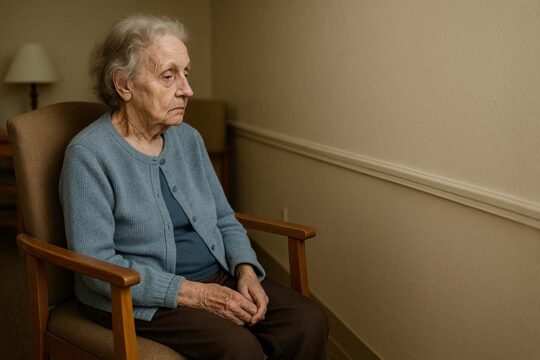
Elderly Feeling Nauseous
Why Do Elderly Feel Nauseous?
Nausea is a common yet concerning symptom among elderly individuals, often signaling underlying health issues that require attention. As people age, they experience various physiological changes and are more likely to develop chronic health conditions, which can contribute to feeling nauseated. Multiple factors can lead to nausea in senior adults. Understanding the causes of nausea in the elderly is essential for effective management and treatment, ensuring that this symptom does not significantly impact their quality of life. If ignored, nausea can cause serious health complications.
Why Do the Elderly Feel Nauseous?
Elderly people feel nauseous due to a variety of reasons, often related to age-associated changes and underlying health conditions. Some common causes include:
- Medications: Many elderly people take multiple medications, and side effects or interactions between these drugs can cause nausea.
- Gastrointestinal Issues: Conditions like gastroesophageal reflux disease (GERD), gastritis, or ulcers can lead to nausea.
- Infections: Viral or bacterial infections, including stomach flu or food poisoning, can cause nausea.
- Chronic Illnesses: Diseases like kidney failure, liver disease, heart failure, and diabetes can lead to nausea.
- Sensory Changes: Aging can affect taste and smell, which can alter appetite and lead to nausea.
- Dehydration: Insufficient fluid intake can cause dehydration, which may result in nausea.
- Neurological Conditions: Disorders like migraines, vestibular disorders, or even strokes can result in nausea.
- Psychological Factors: Anxiety, depression, and stress are common in the elderly and can contribute to feelings of nausea.
- Metabolic Imbalances: Electrolyte imbalances, low blood sugar, or other metabolic issues can cause nausea.
- Post-Surgical Effects: Anesthesia and pain medications used during and after surgeries can lead to nausea in the recovery period.
- Cancer and Treatments: Nausea can be a symptom of cancer itself or a side effect of treatments like chemotherapy and radiation therapy.
- Poor Diet: Malnutrition or consuming foods that are hard to digest can result in nausea.
Given the wide range of potential causes, it’s important for elderly individuals experiencing frequent or severe nausea to consult a healthcare professional for an accurate diagnosis and appropriate treatment.
Can the Elderly Develop Chronic Nausea?
Elderly people can develop chronic nausea, which is a persistent and recurrent sensation of nausea over an extended period. It can arise from various underlying causes. gastrointestinal disorders, chronic diseases like diabetes, kidney disease, liver disease, and heart failure may contribute to prolonged nausea. Neurological conditions, including Parkinson’s disease, migraines, and vestibular disorders, can also cause chronic nausea. Long-term infections, such as chronic hepatitis or persistent bacterial infections, can lead to chronic nausea.
Metabolic imbalances, like electrolyte disturbances or hormonal issues, can be a cause. Malnutrition or age-related changes in the digestive system can result in chronic nausea. Long-term use of certain medications. Chronic stress, anxiety, and depression can be a factor in persistent nausea. Cancer and treatments like chemotherapy and radiation, are known to lead to ongoing nausea.
This condition can significantly impact an elderly person’s quality of life. It’s important for those experiencing chronic nausea to seek medical evaluation and treatment. Proper diagnosis might identify the underlying cause and guide strategies to alleviate symptoms.
Nausea Symptoms in the Elderly
Nausea symptoms in the elderly can present in various ways and may be accompanied by other signs that indicate underlying issues. Common symptoms include:
- Persistent Feeling of Sickness: A continuous sensation of needing to vomit.
- Vomiting: Expulsion of stomach contents, which can occur with or without prior nausea.
- Loss of Appetite: Reduced desire to eat or drink.
- Fatigue: Feeling unusually tired or weak.
- Dizziness or Lightheadedness: A sensation of spinning or losing balance.
- Abdominal Pain: Discomfort or pain in the stomach.
- Dehydration: Dry mouth, decreased urine output, and dark urine due to reduced fluid intake.
- Weight Loss: Unintentional weight loss due to poor nutritional intake.
- Sweating: Excessive perspiration often accompanies nausea.
- Changes in Blood Pressure: An increase or decrease in blood pressure may cause further complications.
Nausea can be a sign of underlying health conditions that may require treatment so it’s important for elderly people who have chronic nausea to see a physician.
What to Give an Elderly Person for Nausea?
Over-The-Counter Treatments:
- Antacids: Medications like Tums or Rolaids neutralize stomach acid and provide quick relief.
- Antihistamines: Drugs like Dramamine or Meclizine can help alleviate motion sickness and general nausea.
- Bismuth Subsalicylate: Products like Pepto-Bismol can soothe the stomach and reduce nausea.
Home Remedies for Nausea:
- Ginger: Ginger tea, ginger ale, or ginger supplements can help reduce nausea.
- Peppermint: Peppermint tea or sucking on peppermint candies can soothe the stomach.
- Hydration: Sipping on clear fluids like water, broth, or herbal tea can prevent dehydration and ease nausea.
- Small, Frequent Meals: Eating small amounts of bland foods like crackers, toast, or rice can help manage nausea.
Rest and Elevation: Encouraging rest and keeping the head elevated can help reduce nausea.
When to Seek Treatment for Nausea in the Elderly:
If nausea persists for more than a few days without improvement, it is important to seek medical attention. Severe symptoms, like nausea accompanied by severe pain, high fever, or vomiting blood, also warrant immediate medical care. Signs of dehydration, such as dry mouth, dark urine, dizziness, or confusion, should not be ignored. Significant or unintentional weight loss due to lack of appetite is another indicator that treatment is necessary. If the elderly person has chronic illnesses like diabetes, heart disease, or kidney disease, which may be exacerbated by nausea, they should see a healthcare provider. If nausea could be a side effect of new or existing medications, consulting a physician is important. Promptly addressing nausea in the elderly is essential to prevent complications and ensure their well-being.
When to Seek Treatment for Nausea in the Elderly:
Seek medical attention if nausea persists for more than a few days without improvement. Immediate care is necessary if severe symptoms such as severe pain, high fever, or vomiting blood accompany the nausea. Dehydration signs, including dry mouth, dark urine, dizziness, or confusion, should also prompt a visit to the doctor. Significant or unintentional weight loss due to lack of appetite is a concern that requires medical intervention.
Is Nausea in the Elderly Dangerous if Left Untreated?
Nausea in the elderly can be dangerous if left untreated. Don’t ignore symptoms when an elderly person shows signs of nausea as it can progress to more serious issues. Persistent nausea can lead to several serious complications, including:
Dehydration: Constant nausea can make it difficult for elderly people to maintain proper fluid intake, leading to dehydration, which can cause confusion, dizziness, and kidney problems.
Malnutrition: Ongoing nausea can reduce appetite and lead to inadequate nutritional intake, resulting in weight loss, weakened immunity, and muscle wasting.
Electrolyte Imbalance: Nausea can disrupt the balance of essential electrolytes in the body, leading to issues such as an irregular heartbeat, muscle weakness, and neurological problems.
Increased Fall Risk: Dehydration, malnutrition, and weakness associated with chronic nausea can increase the risk of falls, which can result in serious injuries in elderly people.
Worsening of Underlying Conditions: Untreated nausea can exacerbate existing health conditions, such as diabetes or cardiovascular disease, complicating the management of these diseases.
Mental Health Issues: Chronic nausea can lead to depression, anxiety, and a decreased quality of life due to the constant discomfort and inability to enjoy normal activities.
Addressing nausea in elderly people promptly can help prevent these serious health issues and improve overall well-being.
Discover the key differences between retirement homes and assisted living to help you choose the right care for your loved one’s needs.
Learn the risks of leaving a dementia patient alone, legal responsibilities, care strategies, and how to plan for their safety.
Learn why dementia patients wander at night, how to prevent it, and when memory care is the safest option for your loved one in San Diego.
Compare memory care and assisted living, from services and costs to safety and staffing, to find the right senior care in San Diego.



